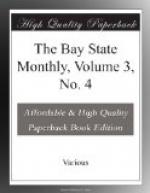“The next day, as you know, I went back to Boston, and a month later was in England. I went directly to S——, and there found the old mansion, once the rightful property of my great-grandfather. I found proof that he sailed for New York, January 23, 1795. But that was not all. The old Wickham mansion had stood for years unoccupied. I learned that after its forfeiture to the crown the whole estate had been granted for life as a reward to the young officer who had brought to the government the evidence of its former owner’s treason. By him it was occupied for some thirty years; then he suddenly disappeared. After that the estate was sold to an eccentric and wealthy bachelor, who built a superb residence thereon, letting the old mansion remain closed. Very recently he had died, leaving no will and no heirs, and the estate again escheated to the crown.
“I was very anxious to search the old mansion, and readily obtained permission to enter. It was built in the time of Elizabeth, and was a large building, similar in architecture to many others built in the sixteenth century in this part of England. As I entered the deserted building a strange feeling of desolation took possession of me. Hardly a human being had been within its walls for fifty years. The dust lay deep on the bare oaken floor, and almost muffled the sound of my footsteps. On one exquisitely carved panel appeared, in defiance of attempts to destroy it, the Wickham coat-of-arms.
“I was searching for nothing in particular, but everything had to me a fascinating interest, and I opened every door and examined every nook and shelf. In one room I came across an antique oaken desk. As I pulled open one of its drawers a half-dozen scared spiders fled before the intruding rays of light. In the drawer there was a small wooden box. There was nothing in this box but a sheet of paper, folded and sealed, and addressed to the attorney-general of England. I hesitated a moment, and then broke it open with excited curiosity. It was the most thrilling moment of my life. Even now, as I tell you this story, I feel the same thrill go through me as when my eyes ran over that page. It was nothing more nor less than a written confession of,—first, treason against the crown of England; and, second, perjury and false witness against Samuel Wickham. It was signed by the officer who appeared against him, and was witnessed by two parties. Strange to say, both of these parties were still living, and able to attest the validity of their signatures and the genuineness of the other. They had merely witnessed this signature at the time, without being aware of the nature of the document.




